高一英语英语必修3Unit1语法情态动词1PPT课件
高一必修三Unit1Grammar情态动词讲解附随堂练习课件(共37张PPT)

should/ought to
• 1. 表示应该 • 此时通常表示现在或将来的责任或义务,意为 “应该,应当”,相当于ought to, be supposed to。 • You should compelte your test in time. • You should tell your mother about it at once.
举例
例句
• • • • • • • I can see you. We can't carry the heavy box. Would you go with me? You must be careful when crossing the street. I used to play with my friends after school. 注意情态动词的位置: 实义动词或系动词之前;如果实义动词之前有 助动词,则情态动词放在助动词之前。(例句 在下页)
• 2. 表示推测 • 表推测时,may/might表示的把握性不大,含有 “或许,大概,可能”之意,一般不用于疑问句。 might表示的可能性比may小。 • Anna may know my phone number. • He might come tomorrow, but I am not quite sure. • I couldn't find my key. I might have left it in my office.
can--could
• 1. 表能力 • Can you type? • He could speak English when he was four years old. • 2. 表请求或允许 • You can go out to play after supper. • ---Could you help me? • ---Of course I can.
人教版高一英语必修三 unit1 grammar 情态动词课件
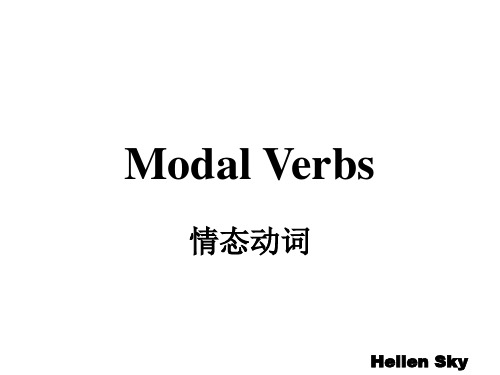
e.g: He must/can/may/might know the answer to the question.
表推测的 三种句式
2. 否定句:can't/couldn't (不可能),may not/might not (可能不)
e.g: It can't/ couldn't be the Miss Lin. She has gone to America.
The boy can’t be Jim. He’s can可能 much taller.
can’t不可能 这个男孩不可能是吉姆。他 要高很多。
2. 常见情态动词
原形
用法
含义
例句
(过去式)
may
(might)
Tony may know the way.
表示可能性(可 与maybe互换)
可能
=Maybe Tony knows the way.
2. 常见情态动词
原形
用法
(过去式)
表示能力(= be able to)
含义
例句
能;会
Tom can swim. =Tom is able to swim.
汤姆会游泳。
can
(could)
(疑问句中)表示 请求
可以 Could you give us a hand?
你可以帮我们一下吗?
(否定句、疑问 句中)表示可能 性
• can 不肯, may 不问,must 不否问
注释: can表示推测通常不用于肯定句 may表示推测通常不用于疑问句 must表示推测通常不用于否定句和疑问句
肯定猜测的语气强弱:must>can> could>may>might
高一英语英语必修3Unit1语法情态动词课件

2迈4.11克.202一0 定还没有找回他的车, 因为早上他是
18
坐公共汽车来上班的。
need & dare (dared)
情态动词 : (无单三形式)
need/dare do sth need/dare not do sth 实意动词: need/dare to do sth don’t/doesn’t/didn’t dare to do sth
24.11.2020
22
2 Some aspects of a pilot’s job_____ be
boring, and pilots often _____ work at inconvenient hours. (2006 湖南) A. can;have to B. may;can
C. have to; may
24.11.2020
10
4.shall和should
shall 用法 1. shall表征求意见,用于一三人称 疑问句中
Shall we go by train, Mom? Shall he attend the meeting? 2.用于二 三人称 的陈述句中,表威胁警告命令允诺等语 气 You shall get a present when I came back. You shall be punished if you break the rules.
Wuhan.
2. At this moment, our teacher ___m__u_s_t_b__e_m__a_r_k_ing
our exam papers.
这时, 我们老师想必在批改试卷。
3. The road is wet. It _m__u_s_t_h__a_v_e__r_a_in__edlast night.
高一英语英语必修3Unit1语法情态动词课件
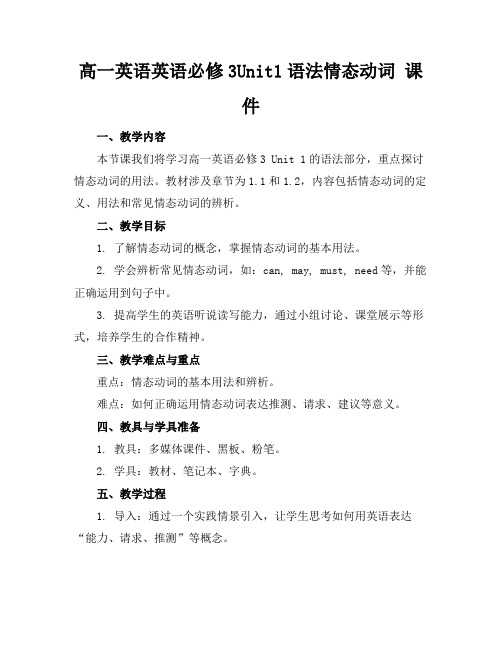
高一英语英语必修3Unit1语法情态动词课件一、教学内容本节课我们将学习高一英语必修3 Unit 1的语法部分,重点探讨情态动词的用法。
教材涉及章节为1.1和1.2,内容包括情态动词的定义、用法和常见情态动词的辨析。
二、教学目标1. 了解情态动词的概念,掌握情态动词的基本用法。
2. 学会辨析常见情态动词,如:can, may, must, need等,并能正确运用到句子中。
3. 提高学生的英语听说读写能力,通过小组讨论、课堂展示等形式,培养学生的合作精神。
三、教学难点与重点重点:情态动词的基本用法和辨析。
难点:如何正确运用情态动词表达推测、请求、建议等意义。
四、教具与学具准备1. 教具:多媒体课件、黑板、粉笔。
2. 学具:教材、笔记本、字典。
五、教学过程1. 导入:通过一个实践情景引入,让学生思考如何用英语表达“能力、请求、推测”等概念。
2. 新课内容:讲解情态动词的定义、用法,通过例句展示不同情态动词的用法。
3. 例题讲解:分析教材中的例题,讲解解题思路,引导学生正确使用情态动词。
4. 随堂练习:布置教材中的练习题,让学生当堂完成,并及时给予反馈。
5. 小组讨论:让学生分成小组,讨论如何在不同情境下使用情态动词,并进行课堂展示。
7. 作业布置:布置课后作业,要求学生运用所学知识完成。
六、板书设计1. 情态动词的定义和用法2. 常见情态动词的辨析3. 课堂练习和答案七、作业设计1. 作业题目:(1)完成教材1.2中的练习题。
(2)用情态动词编写一段对话,描述一个实践情景。
2. 答案:八、课后反思及拓展延伸1. 反思:本节课的教学效果,学生的掌握程度,以及教学过程中的不足。
2. 拓展延伸:鼓励学生在课后阅读英语文章,观察情态动词在不同语境下的使用,提高英语实际运用能力。
同时,布置一道拓展题目,让学生尝试用所学情态动词描述一个更复杂的实践情景。
重点和难点解析一、教学难点与重点1. 重点:情态动词的基本用法和辨析。
Unit 1 Grammar(情态动词)-高中英语人教版必修三课件 (共17张PPT)
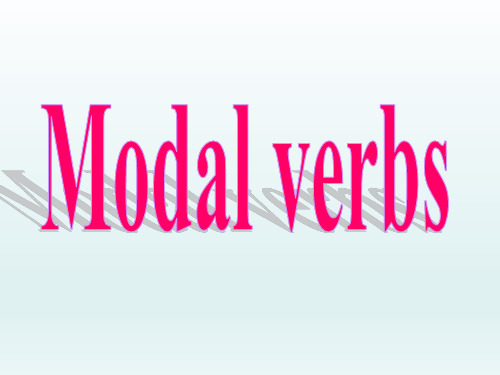
A. must have arrived
B. ought to have arrived
C. must arrive
D. ought to arrive
(4) Must I drive to his house and pick up the
children?"
"No, C ."
A. you shouldn't
1.Ability (能力):
I am confident that we can defeat the epidemic!
can/could: 1. can 表示能力或者一种客观可能
性,还可以表示请求和允许 。
__C_a_n___ I use your computer? Learning English _c_a_n__ be difficult.
can/could: 4. can never/can’t……too表示 “无论怎样…也不过分”,“越…越 好” 。
你w过Yhoi马lue路cca的rno时’tss候bine再g t小toh心oe也csa不trre为efeu过tl.。
must
You must wear a mask when you go out, or you will be easily infected.
shall:
2.Shall用于第二、第三人称,表 示说话人给对方命令、警告、允 诺或威胁。
You shall fail if you don‘t work harder.
警告
He shall be punished according to the
rule. 威胁
承诺
等He我s读h完al这l h本a书ve,t就he会给bo他ok的。when I finish it.
高一英语英语必修3Unit1语法情态动词推荐(课堂PPT)
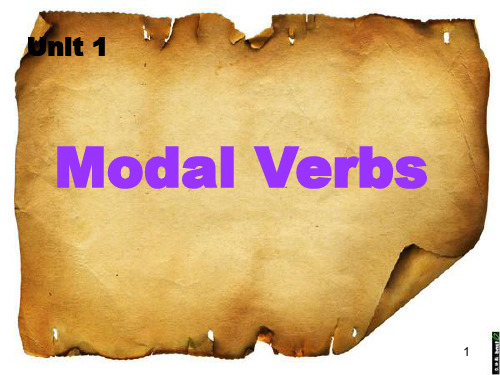
2020年5月5日星期
2
二
• 情态动词的特点: 1.情态动词自身都有一定的意义, 但不能表示正在发生或已经发生的 事情,只表示期待或估计某事发生。 2.情态动词除ought和have外,后 面必须接不带to的不定式。 3.情态动词没有人称和数的变化, 也没有非谓语形式。
2020年5月5日星期
3
二
1. can和could
Unit 1
Modal Verbs
1
什么是情态动词? (Modal 情V态er动bs词) 表示说话人的某种
感情或语气,对某一动作
或状态的某种态度。
表示“需要、可以、can/could, 必须、应当”等。 may/might,
must/ have to,
shall/should (ought
to), will/would need, dare
eg. Can I sit here?
2020年5月5日星期
二
2. could的主要用法是: A. could 是can的过去式, 表示与过去 有关的能力 和推测:
We all knew that the young man couldn’t be a doctor. B. could可以代替can表示请求, 但语气较can客气、 委婉:
4. may as well=had better do
(最好做某事)
You’d better take notes carefully. You may as well take notes carefully.
2020年5月5日星期
10
二
5.might 可用于指过去的行为或者表示可能性 更小。 e.g.他也许在做功课吧。 He might be doing his homework now.
高一英语英语必修3Unit1语法情态动词 (共35张PPT)
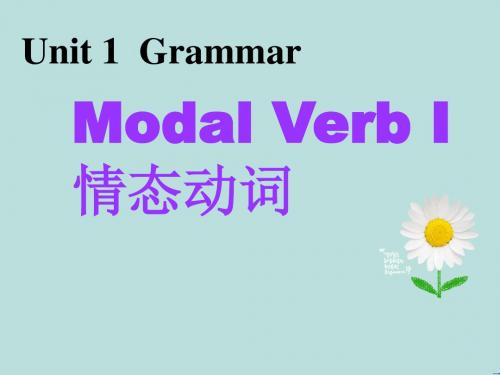
may和might
may 的用法:
1. 表示请求、允许(比can较为正式)
eg. May I come in ?
You may go now.
★用may 提问,否定回答用
must not (mustn’t) 禁止、阻止
had better not 最好别 may not 不可以
12/4/2018 3
Underline the modal verbs ④ In European countries, people will
usually decorate churches
⑤ She would never forget him.
⑥ At the Spring Festival in China, people may give children lucky money in red
could的主要用法:
1. could ---can的过去式, 表示与过去 有关的能力或推测: eg. I can speak fluent English now , but I couldn’t last year.
2. could可以代替can表示请求, 但语气较can 客气、委婉: eg. Could you lend me your dictionary? Could I use your bike? ★用could 提问,答语用can (即:could 不能用于现在时态的答语中) ---Could I borrow your pen? ---yes, you can.
can和be able to辨析
can(could)和be able to都可以表示能力,意思
上没有区别。但can只有现在式和过去式,
高一英语英语必修3Unit1语法(1)精品PPT课件
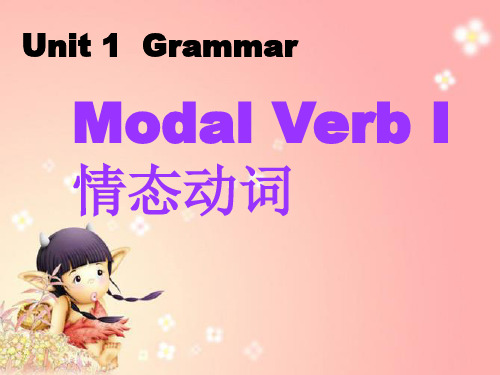
27.10.2020
10
表示肯定的猜测,语气非常肯定,近乎 确定的意味,
用must + do “ 现在肯定…”
must + have done “过去肯定…”
It must be eleven o’clock now.
He must have left when I came back last night, because I didn’t see him at home.
2. ----No, you___. You should do your
3. homework first.
4.
A.better not
6.
C. Must; mustn’t
7.
D. Need; mustn’t
2. ---Where is Emma? ---I can’t say for sure where she is, she___ be out shopping. A. can B. should C. must D. may
可能性从大到小排列: 27.10.2020 can→ could→ may →might 14
做情态动词练习的技巧:
1. 看题目意思,通过意思来选 情态动词。
2. 死记硬背情态动词的特殊用 法。
27.10.2020
15
Exercise
1. ----____ I go out to play, mum?
式的变化(could, would, might)。
学过的情态动词有: can/could能, may/might可能、也许, ought to应该, must不得不(主观上的) dare敢, need 需要 shall/should 应该, will/would
必修3Unit1情态动词语法ppt课件
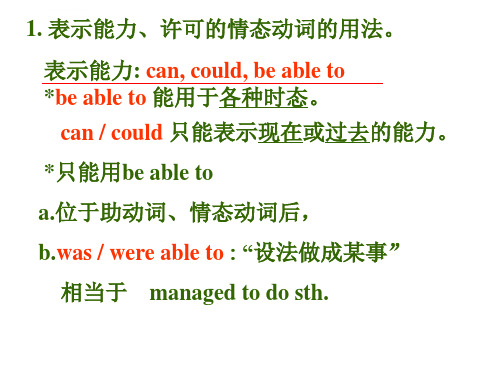
例1:---Could I borrow your dictionary?
---Yes, of course you____.
A. might
B. will
C. can
D. should
析:选C。该句用can的委婉表达式could 来征 求对方意见,could 和might通用,但回答 时必须要用can或may,因此该题不选A.
火灾袭来时要迅速疏散逃生,不可蜂 拥而出 或留恋 财物, 要当机 立断, 披上浸 湿的衣 服或裹 上湿毛 毯、湿 被褥勇 敢地冲 出去
should
should
should用于构成将来时是助动词。should用于表示 “应当”“猜测”是情态动词。
(1) 表示义务,责任,意为“应当” 。
You should pay for your taxes.
析:选A。根据规定need用于一般疑问句 作肯定回答应换成must,而作否定回答 时,使用need的否定式needn’t。
火灾袭来时要迅速疏散逃生,不可蜂 拥而出 或留恋 财物, 要当机 立断, 披上浸 湿的衣 服或裹 上湿毛 毯、湿 被褥勇 敢地冲 出去
7.
shall和should的用法
• Shall
火灾袭来时要迅速疏散逃生,不可蜂 拥而出 或留恋 财物, 要当机 立断, 披上浸 湿的衣 服或裹 上湿毛 毯、湿 被褥勇 敢地冲 出去
例1:---Must I start at once?
---No, you____.
A. needn’t
B. mustn’t
C. can’t
D. won’t
析:A。由语境可知该答句表示“不必”, 而mustn’t表示“不准、禁止”,不符合语 境,显然应使用needn’t表示“不必”,但 肯定句回答继续用must。
必修三英语unit1情态动词的用法37页PPT

31、只有永远躺在泥坑里的人,才不会再掉进坑里。——黑格尔 32、希望的灯一旦熄灭,生活刹那间变成了一片黑暗。——普列姆昌德 33、希望是人生的乳母。——科策布 34、形成天才的决定因素应该是勤奋。——郭沫若 35、学到很多东西的诀窍,就是一下子不要学很多。——洛克
必修三英语unit1情态动词的用法
11、获得的成功越大,就越令人高兴 。野心 是使人 勤奋的 原因, 节制使 人枯萎 。 12、不问收获,只问耕耘。如同种树 ,先有 根茎, 再有枝 叶,尔 后花实 ,好好 劳动, 不要想 太多, 那样只 会使人 胆孝懒 惰,因 为不实 践,甚 至不接 触社会 ,难道 你是野 人。(名 言网) 13、不怕,不悔(虽然只有四个字,但 常看常 新。 14、我在心里默默地为每一个人祝福 。我爱 自己, 我用清 洁与节 制来珍 惜我的 身体, 我用智 慧和知 识充实 我的头 脑。 15、这世上的一切都借希望而完成。 农夫不 会播下 一粒玉 米,如 果他不 曾希望 它长成 种籽; 单身汉 不会娶 妻,如 果他不 曾希望 有小孩 ;商人 或手艺 人不会 工作, 如果他 不曾希 望因此 而有收 益。-- 马钉路 德。
人教版高中英语必修三单元一Book3 Unit1 Modal Verbs情态动词(共11张PPT)

•9、要学生做的事,教职员躬亲共做;要学生学的知识,教职员躬亲共学;要学生守的规则,教职员躬亲共守。2021/8/252021/8/25Wednesday, August 25, 2021 •10、阅读一切好书如同和过去最杰出的人谈话。2021/8/252021/8/252021/8/258/25/2021 4:38:08 AM •11、只有让学生不把全部时间都用在学习上,而留下许多自由支配的时间,他才能顺利地学习……(这)是教育过程的逻辑。2021/8/252021/8/252021/8/25Aug-2125-Aug-21 •12、要记住,你不仅是教课的教师,也是学生的教育者,生活的导师和道德的引路人。2021/8/252021/8/252021/8/25Wednesday, August 25, 2021
区别: must 只有现在时 have to 可用在现在时,过去时,将来时
must 表示主观看法 have to 表示客观需要 I don't like this radio. I must buy a new one. The radio is broken. I have to buy a new one.
• You have to believe in yourself. That's the secret of success. 人必须相信自己,这是成功的秘诀。
•
3. must 和 have to
1)表示必须、应该 necessity The work must be finished. You have to hand in homework. must否定形式must not(mustn't) 表示“不应该”、“禁止”…… 在回答must的问句时,否定式常用needn't或 don't have to 表示不必,而不用must not. -Must I be home before nine o'clock, Mum? -Yes, you must. -No, you needn't. / No, you don't have to. 2)表示推测“一定” There must be something wrong.
2019人教版高中英语必修三Unit1 Grammar 情态动词 精品课件(共20张PPt)
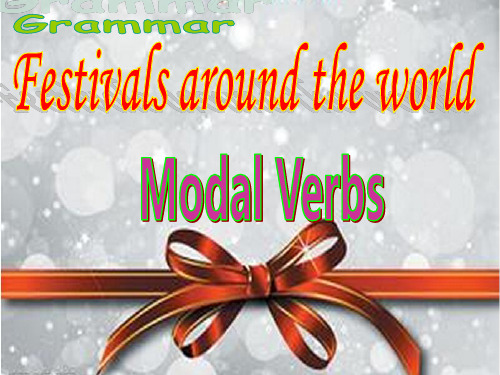
shall, should, ought to
1. shall 用于第二、三人称肯定句,表示命 令,警告,威胁 ;
You shall fall behind in your exam if you keep playing. The interest shall be divided into five parts, according to the agreement made by both sides.
固定搭配: may/might as well do sth 不妨,最好 There is nothing to do, so I may as well go to bed.
will和would
1. 用于表示“意志”“决心”
I will offer you any information you need.
must 和 have to 1.must 表示推测时, 只能用于肯定句。
这个电脑肯定出了问题。 There must be something wrong with the computer. You have worked hard all day. You must be tired. Cars must not be parked here.
could主要用法: 1. could 是can的过去式, We all knew that the young man couldn’t be a doctor. B. could可代替can表示请求, 语气较委婉: I would appreciate if you could….
can与be able to 区别
3. 表示请求或允许:Can I sit here?
习惯搭配: cannot …too/enough 再…也不为过 I can’t thank you enough/too much. can’t wait to do sth 迫不及待做某事 can’t (help) but do sth 不得不做某事 can’t help doing sth 禁不住做某事
- 1、下载文档前请自行甄别文档内容的完整性,平台不提供额外的编辑、内容补充、找答案等附加服务。
- 2、"仅部分预览"的文档,不可在线预览部分如存在完整性等问题,可反馈申请退款(可完整预览的文档不适用该条件!)。
- 3、如文档侵犯您的权益,请联系客服反馈,我们会尽快为您处理(人工客服工作时间:9:00-18:30)。
7
情态动词的语法特征
1. 情态动词 不能单独做谓语,除ought 和have外,后面只能接不带to 的不定式。
2. 情态动词没有人称,数的变化,但有 些情态动词,如can, will也有一般式 和过去式的变化。Biblioteka 03.10.20208
只作情态动词的
can/could, may/might, ought to, must 可情态可实义的 need, dare/dared 可情态可助动词的 shall/should, will/would 相当于情态动词的 have to, used to
03.10.2020
5
Permission: All passengers may now
board.
We can board now.
Obligation: You must fasten your seat
belts.
(strong) You should pay attention.
(weak)
情态动词表示说话人的某种 感情或语气,对某一动作 或状态的某种态度。 表示“需要、可以、 必须、应当”等。
03.10.2020
4
Words like can, will, may, must, and a few others are called modals. Modal verbs help other verbs express a
You ought to pay attention.
Possibility: 1 It may rain.
2 How could I forget an
important thing like that?
3 He can’t /couldn’t have
known 03.10.2020 the result.
meaning or an idea. Some common uses of the modals are these: Ability: 1 He can speak English now.
2 He couldn’t speak English a year ago.
3 I’m not able to come to the
Unit 1
Modal Verb I
Translate the following sentences into Chinese. Pay attention to the mood. 1. He must have gone to Beijing.
他一定已经去北京了。
2. The door was locked. She couldn’t have been at home. 门是锁着的, 所以她不可能在家。
6
Meanings similar to those of the
modals can often be conveyed by real
verb forms:
He has to……………………….=…must…
is able to…speak English… =…can…
is allowed
03.t10o.20…20 …………....=…may…
eg. Can the news be true? C. 在口语中, can可以表示请求或允许:
eg. Can I sit here?
03.10.2020
10
2. could的主要用法是: A. could 是can的过去式, 表示与过去 有关的能力和推测: eg. We all knew that the young man couldn’t be a doctor. B. could可以代替can表示请求, 但语气 较can客气、委婉:
3. They may be still waiting for us. 他们可能还在等我们呢。
03.10.2020
2
4. He might have read about the news in the newspaper. 他可能已经从报纸上知道这个消息了。
5. You should have told him a week ago. 你本来应该在一周前告诉他的。
03.10.2020
3. 情态动词的“时态”形式并不是时间 区别的主要标志,不少情况下,情态动 词的现在式形式和过去式形式都可用来 表示现在时间、过去时间和将来时间。
03.10.2020
9
can和could
1. can的主要用法是: A. 表示体力或脑力的能力:
eg. The girl can dance very well. B. 表示说话者的推测﹑事物的可能性:
13
eg. --I believe the man is from England. --But I may be wrong. The guest may arrive this afternoon.
在肯定句中,may 的可能性比can 高, may 表示现实的可能性,can 表示理论 上的可能性。如:
03.10.2020
11
eg. Could you lend me your dictionary? Could I use your bike?
3. can和could接动词的完成形式,表 示可能已经做某事。can用在否定和疑 问句中, 表示不相信、怀疑等态度。 eg. They can't have gone out because
the light is still on.
03.10.2020
12
may和might
may 常用来表示: A. 表示请求、允许:
比can较为正式:
eg. May I come in ?
You may go now. B. 表示说话人的猜测: “也许” “可 能”: 通常只用于肯定句和否定句中。
03.10.2020
6. Can you give me some suggestions? 你能给我一些建议吗?
7. They wanted to know when you would go to the park. 他们想知道你们什么时候去公园。
03.10.2020
3
什么是情态动词? (Modal Verbs)
